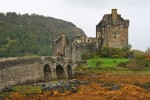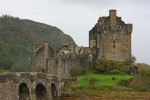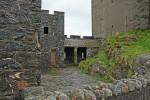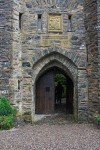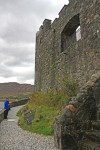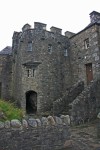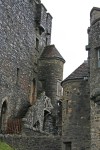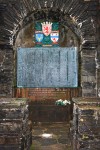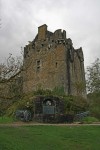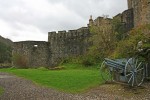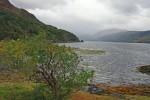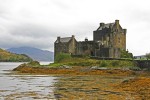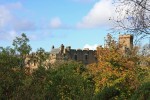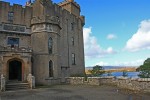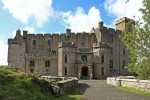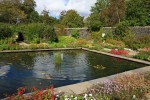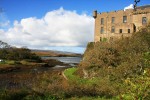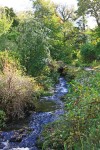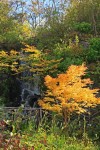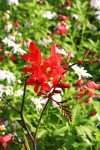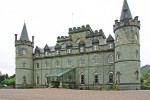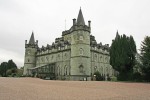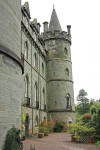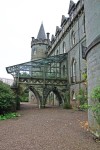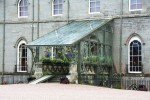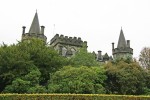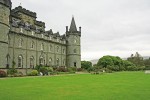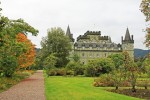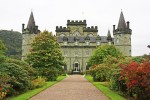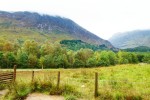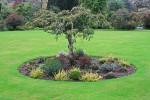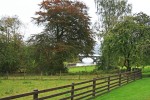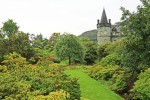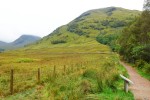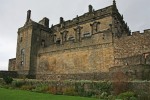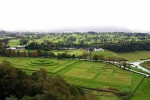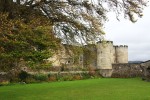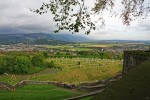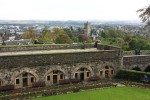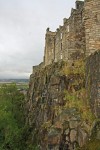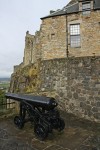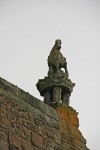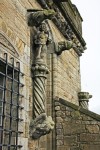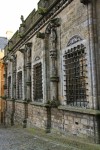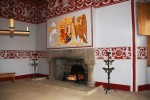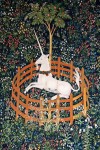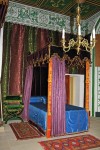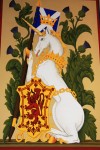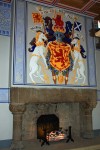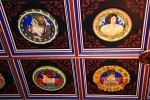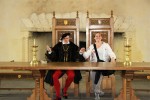Castles of Scotland
Eilean Donan Castle, Dornie, Scotland
|
Eilean Donan is a small tidal island in Loch Duich in the western Highlands of Scotland.
Eilean Donan, which means simply "island of Donnán", is named after Donnán of Eigg,
a Celtic saint martyred in 617. Donnán is said to have established a church on the
island, though no trace of this remains. A picturesque castle dominates the island,
which lies about 1 kilometre
from the village of Dornie. The castle was founded in the 13th century, and
became a stronghold of the Clan Mackenzie and their allies the Clan Macrae. In the early
18th century the Mackenzies' involvement in the Jacobite rebellions led in 1719 to
the castle's destruction by government ships. Lieutenant-Colonel John Macrae-Gilstrap's
20th-century reconstruction of the ruins produced the present buildings. In 2001,
the island had a recorded population
of just one person, but there were no "usual residents" at the time of the 2011 census.
|
Click on an image to see a larger version,
hold cursor on image to see caption
Use arrow icons or
arrow keys to navigate on photo pages.
Dunvegan Castle, Isle of Skye, Scotland
|
Dunvegan Castle lies to the north of Dunvegan on the Isle of Skye,
situated off the West coast of Scotland. It is the seat of the MacLeod of MacLeod,
chief of the Clan MacLeod. Dunvegan Castle is the oldest continuously inhabited
castle in Scotland and has been the stronghold of the chiefs of the clan for 800
years. Among the treasures of Dunvegan is a green fairy flag, which some materialists
believe to be only a relic of the Crusades -- a consecrated banner of the Knights
Templars, but which all true Highlanders affirm to have been a gift to some ancestral
MacLeod, from a fairy maiden. She promised that on three distinct occasions when he
or his clan were in danger, he might wave the flag with certainty of relief.
|
Click on an image to see a larger version,
hold cursor on image to see caption
Use arrow icons or
arrow keys to navigate on photo pages.
Inveraray Castle, Argyll, Scotland
|
Inveraray Castle is a country house near Inveraray in the county of Argyll,
in western Scotland, on the shore of Loch Fyne. It has been the seat of the Duke
of Argyll, chief of Clan Campbell since the 17th century. In 1744 the third Duke
of Argyll decided to demolish the existing castle and start from scratch with a
new building. The castle was 40 years in construction and the end product was not
a castle in the traditional sense, but a classic Georgian mansion house on a grand
scale.
|
Click on an image to see a larger version,
hold cursor on image to see caption
Use arrow icons or
arrow keys to navigate on photo pages.
Stirling Castle
|
Stirling Castle, is one of the largest and most important castles, both
historically and architecturally, in Scotland. It is surrounded on three sides
by steep cliffs, giving it a strong defensive position. Most of the principal
buildings of the castle date from the fifteenth and sixteenth centuries. A few
structures of the fourteenth century remain, while the outer defences fronting
the town date from the early eighteenth century. During a long and bloody history
Stirling Castle has been attacked or besieged at least 16 times.
|
Click on an image to see a larger version,
hold cursor on image to see caption
Use arrow icons or
arrow keys to navigate on photo pages.
